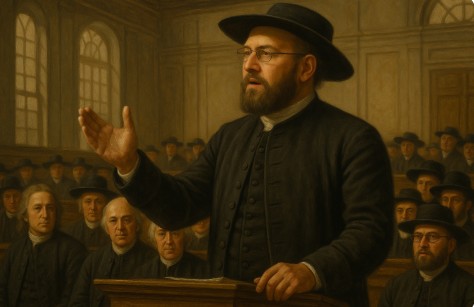or is it finding my inner Pennamite
I didn’t expect to move to Pennsylvania and find myself admiring its political architecture. I’ve lived in enough places to know that local governance is usually just a patchwork of whatever history left behind. But Pennsylvania hits different. Its decentralized structure isn’t an accident — it’s the living legacy of a group of people I’d foolishly dismissed as historical wallpaper.
The Quakers.
Growing up, they’re presented like a moral after-school special. Quiet hats. Quiet lives. Corny stories about kindness. A pacifist footnote to the “real” history. What nobody bothers to explain is that the Quakers were intellectually and morally centuries ahead of the society around them, and they built a political culture that reflected that.
And now that I’m here — seeing their fingerprints on how this state operates — I’m starting to understand what we lost by not letting their worldview shape the whole country.
Because here’s the truth you don’t get in school:
The Quakers believed all people were equal.
Not “equal under law if they behaved properly.”
Not “equal if they were male, white, and property owners.”
Not “equal in some theoretical spiritual sense.”
Equal.
Full stop.
Quaker theology — their entire social project — rested on the idea that every person carries an inner light. Every person is fully human. Every person deserves dignity, autonomy, and protection from domination. That conviction wasn’t soft idealism; it was the most radical political stance in the colonies.
They opposed slavery.
They opposed violent coercion.
They opposed inherited hierarchy.
They opposed the idea that anyone should be placed “over” anyone else by birth or station.
And they baked that into governance.
Not speeches — structures.
Pennsylvania was designed to limit the ability of one group to impose on another, because Quaker political philosophy insisted that domination itself was a moral failure. That’s why power is spread so widely here. Why the executive branches are intentionally constrained. Why local control is robust instead of ornamental. Why state government leans toward consensus, restraint, and the slow work of mutual responsibility.
This state was literally engineered around the principle:
No person should be subjected to another.
And here’s the part that keeps hitting me:
If that philosophy — the one Pennsylvania actually lived — had been taken seriously at the Constitutional Convention, we may have avoided the Civil War entirely.
Not because Quakers were perfect or because Pennsylvania was a utopia, but because the Founders were wrestling with one giant moral contradiction:
a nation claiming liberty while writing slavery into its bones.
Quaker governance offered a blueprint that didn’t dodge the contradiction — it solved it.
Human equality wasn’t a bargaining chip.
It wasn’t up for debate.
It was the starting point of the entire system.
Imagine if that had been the national model instead of the compromise model — the version of America built on balancing enslavers and abolitionists in the same sentence. Imagine if we’d chosen the structure built around shared dignity, not power-sharing between incompatible moral worlds.
A different Constitution was possible.
A different Republic was possible.
A different future was possible.
And that’s what I keep feeling as I learn more about the state I’m now living in:
Pennsylvania didn’t just get lucky.
Pennsylvania was designed by people who understood that a free society only works if everyone is free — not rhetorically, but structurally.
That’s why I’m responding to it.
Not because I’m becoming a Pennamite, but because somewhere in me there’s always been a belief that freedom requires limits, equality requires architecture, and a republic requires virtue that isn’t performative — it’s embedded.
The Quakers didn’t paint themselves as visionaries. They didn’t brag. They didn’t crow about moral superiority. But they built something extraordinary: a political culture where domination is suspect, decentralization is deliberate, and equality isn’t a slogan — it’s the core design.
I’m not discovering Pennsylvania.
I’m discovering the kind of country we could have had if the rest of America had listened.
And if finding my inner Pennamite means recognizing that, then maybe I’ve been one all along.


